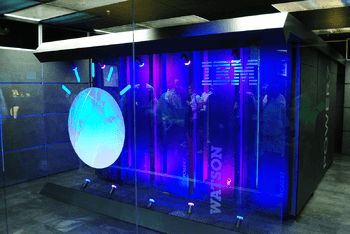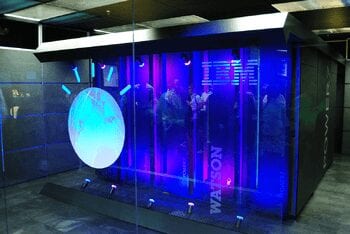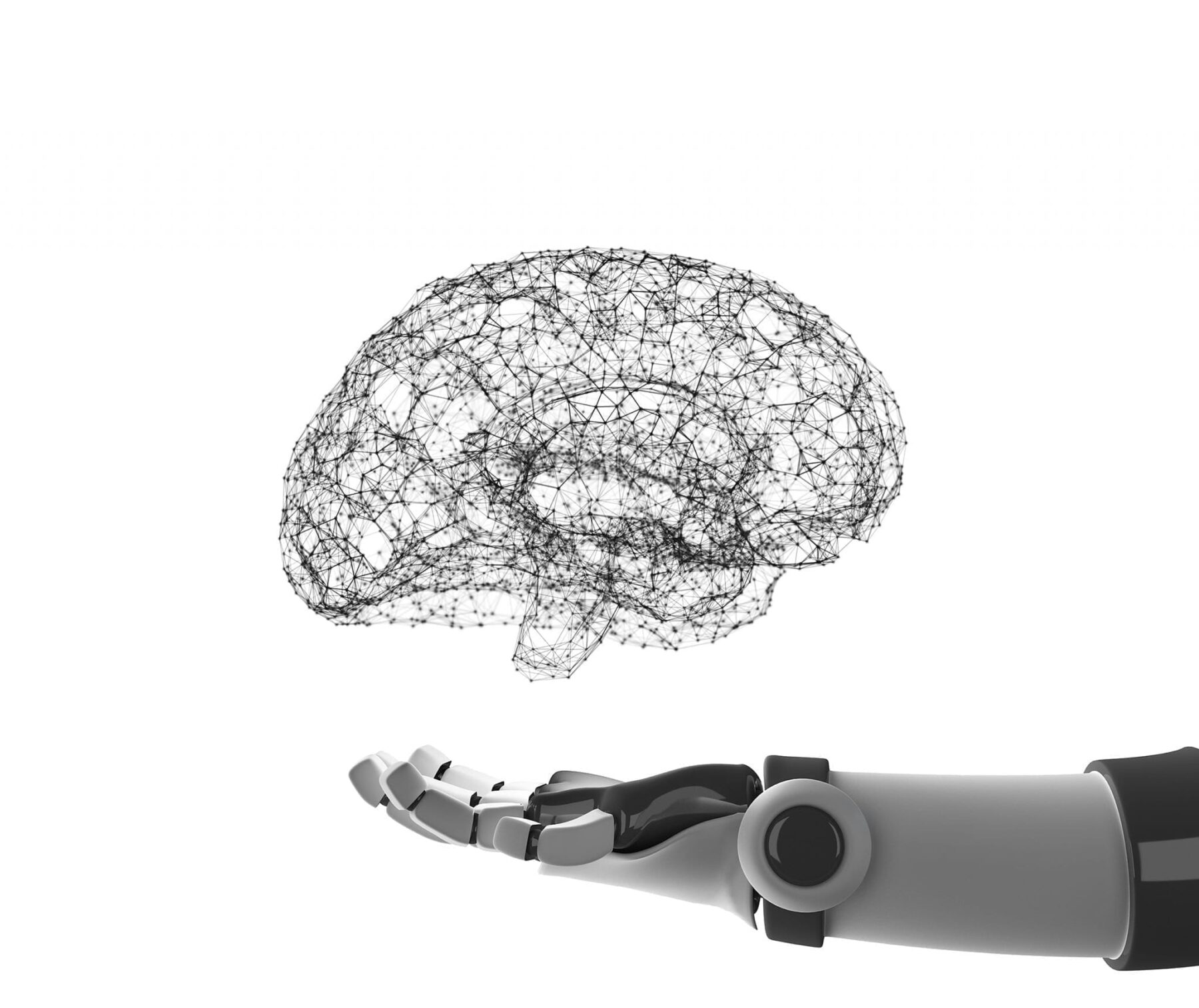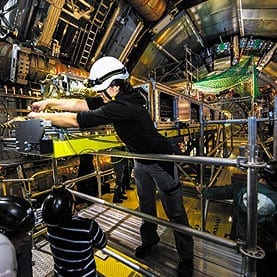
Watson may have won Jeopardy, but the supercomputer’s real-world uses–in medicine, education, and beyond–are only now coming into play.
Terrell Jones, the founder of Travelocity and the founding chairman of Kayak.com, let the world in on a secret yesterday: “The guy that started the online travel revolution–me–I use travel agents.”
Not to book a flight to New York or anything, but to plan his perfect vacation. “You can’t get expert travel advice on the web. You can get reviews, but you can’t get advice,” he said at an event hosted by IBM.
That could be starting to change for a wide variety of industries as IBM moves Watson–the conversant supercomputer that famously won Jeopardy in 2011–into real-world applications and seeks to usher in what CEO Ginni Rometty describes as “a new era of machine-human collaboration”–like having a computer recommend you the perfect travel destination.
Yesterday, the company said it would pour more than $1 billion and almost 2,000 staff into a New York City division that will not only help people process the exploding amounts of information around them, but also think it through and make decisions. “It may, in fact, start to re-humanize the Internet,” Mike Rhodin, the chief of the newly formed Watson Group, says.
IBM is far from the only company pursuing a market for recent advancements in artificial intelligence technology. But Watson’s unique ability to learn as it goes and IBM’s track record working with businesses and governments means that its new commercial partners–from a top cancer research institute to banks and retailers, as well as the ecosystem of startups it is now courting with a $100 million investment fund–are at the forefront of a major shift in how we use our computers.
Here are some ways that “cognitive computing” programs like Watson, which since its Jeopardy days is now faster, smarter, and smaller (it takes up the space of three stacked pizza boxes, rather than an entire bedroom), could have an impact on how people and businesses interact with information:
Yesterday, the company said it would pour more than $1 billion and almost 2,000 staff into a New York City division that will not only help people process the exploding amounts of information around them, but also think it through and make decisions. “It may, in fact, start to re-humanize the Internet,” Mike Rhodin, the chief of the newly formed Watson Group, says.
IBM is far from the only company pursuing a market for recent advancements in artificial intelligence technology. But Watson’s unique ability to learn as it goes and IBM’s track record working with businesses and governments means that its new commercial partners–from a top cancer research institute to banks and retailers, as well as the ecosystem of startups it is now courting with a $100 million investment fund–are at the forefront of a major shift in how we use our computers.
Here are some ways that “cognitive computing” programs like Watson, which since itsJeopardy days is now faster, smarter, and smaller (it takes up the space of three stacked pizza boxes, rather than an entire bedroom), could have an impact on how people and businesses interact with information:
BE OUR REAL, EVERYDAY ASSISTANTS
Siri says she’s a smart assistant, but does anyone believe her?
Someone like Travelocity’s Jones would never ask Siri where he should take his family on an adventurous vacation. But that’s the goal of the next wave of natural language assistants powered by Watson. Jones showed how Watson could quickly read through 64 million reviews, 16 million blogs, and 7,000 guides to recommend with 97% confidence that a trip to Bali was the perfect trip for him. If he gave it additional information (say he wanted more than just a beach), it spit back Punta Cana. “That’s something you can’t ask any travel site today,” he says.
Other demos show this kind of interaction in realms beyond travel, such as creating personal shopping assistants and health coaches.
The Latest on: IBM’s Watson
[google_news title=”” keyword=”IBM’s Watson” num_posts=”10″ blurb_length=”0″ show_thumb=”left”]
via Google News
The Latest on: IBM’s Watson
- MIT's Ragan-Kelley Innovates with Custom Programming Languages for Advanced Visual AI Systemson May 5, 2024 at 5:05 am
MIT's Jonathan Ragan-Kelley develops new programming languages to maximize hardware efficiency for AI and graphics, focusing on specialized accelerators and GPUs to surpass CPU limitations.
- IBM and AWS forge global alliance, streamlining access to AI and hybrid cloud solutionson May 3, 2024 at 5:11 am
This partnership will allow businesses in 92 countries access to IBM’s software products, including data technologies and AI, directly through the AWS Marketplace.
- News Explorer — Artificial Intelligence Can Detect Money Laundering on the Bitcoin Blockchainon May 1, 2024 at 11:55 am
Artificial Intelligence Can Detect Money Laundering on the Bitcoin Blockchain. A new report by blockchain analysis firm Elliptic and the MIT-IBM Watson AI Lab reveals that artific ...
- Here's How AI Can Help Find Money Laundering on Bitcoinon May 1, 2024 at 11:46 am
An Elliptic report shows how MIT-IBM AI Labs used deep learning AI models to pinpoint fraud on the world’s dominant blockchain.
- Blockchain Sleuth Elliptic Explores AI and Anti-Money Laundering Using 200M Bitcoin Transactionson May 1, 2024 at 6:01 am
Patterns of illicit activity involving groups of bitcoin nodes and chains of transactions are described in a research paper by Elliptic and MIT-IBM Watson AI Lab.
- IBM cuts new Watson deals that push it deeper into healthon April 26, 2024 at 5:33 pm
PCWorld helps you navigate the PC ecosystem to find the products you want and the advice you need to get the job done.
- Why IBM’s dazzling Watson supercomputer was a lousy tutoron April 26, 2024 at 2:00 am
With a new race underway to create the next teaching chatbot, IBM’s abandoned 5-year education push offers lessons about AI’s limits.
- This tiny chip can safeguard user data while enabling efficient computing on a smartphoneon April 23, 2024 at 3:56 pm
A new chip can efficiently accelerate machine-learning workloads on edge devices like smartphones while protecting sensitive user data from two common types of attacks -- side-channel attacks and ...
- IBM: I Disagree With Wall Streeton April 21, 2024 at 3:04 am
There is a divergence of opinion on IBM stock between Wall Street and Main Street analysts. Read why I disagree with Wall Street and rate IBM as a Buy.
- A Cautionary AI Tale: Why IBM’s Dazzling Watson Supercomputer Made a Lousy Tutoron April 8, 2024 at 5:00 pm
In the annals of artificial intelligence, Feb. 16, 2011, was a watershed moment. That day, IBM’s Watson supercomputer finished off a three-game shellacking of Jeopardy! champions Ken Jennings ...
via Bing News











